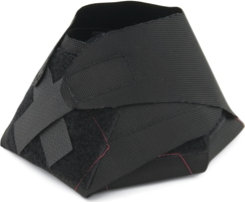I have, and I suggest other horse owners buy, two primary Horse Nutritional References: “Equine Clinical Nutrition, Feeding and Care”, by Lon Lewis and “Feed to Win II”, by the Research Staff of Equine Research, Inc.
Both books provide great information in not only understanding equine nutrition but all other problems relating to feeds and digestion such as parasites, disease, colic, etc.
Jenny from upstate New York e-mailed me with the comment that a previous post and video from me stated an average horse needs about 20 lbs of hay a day. She contends that she provides her horse much less a day in straight alfalfa. Jenny estimates that she feeds about 13 lbs of hay a day to her gelding, “Roberto”.
I’m not going to argue with Jenny,…..don’t like to argue in the first place, and in the second place, she is with her horse, I’m not. But how old her horse is, what condition he is in, how much energy he expends, and how much he weighs are all among the biggest factors that go into how much that particular horse needs.
So in this post I am going to simplify and outline what Lon Lewis has written about horse energy needs.
The average horse, say 1,100 lbs, for maintenance – meaning not losing nor gaining weight, needs a daily Digestible Energy (DE) level measured in Mega-Calories (Mcals) of 16.4 Mcals. Where larger Draft type horses have a higher DE requirement, from 19 to 24 Mcals.
When performing additional work, the Horse needs additional energy (DE):
Working Horses in a light capacity: DE = Maintenance level DE x 1.25
Moderately working horses: DE = Maintenance level DE x 1.5
Intensely working horses: DE = Maintenance level DE x 2.0
With Alfalfa averaging 1.10 Mcal per pound, an 1,100 lb horse would need 14.9 lbs of Alfalfa each day for his Maintenance DE requirements. Take 16.4 daily DE for maintenance and divide by 1.10 Mcals per lbs of Alfalfa.
Feeding only that same horse Bermuda Grass at 0.80 Mcal per pound, an 1,100 lb horse would need 20.5 lbs of grass each day for his Maintenance DE requirements. Take 16.4 daily DE for maintenance and divide by 0.80 Mcals per lb of Bermuda Grass.
Riding your horse at a consistent jog (trot) for 3 hours could raise his DE requirements by 6 to 10 Mcals depending upon how much weight he carried, how good of shape he is in and how fast your jog (trot) is. Caution should be used when feeding extra rations to make up for expended energy. You don’t have to give him extra feed all at one time, or even in one day.
Keeping in mind some basic Horse Nutrition concepts such as providing a Horse no less than half, and preferably more, of his DE in forage (hay and grasses), and that a Horse cannot digest more than 5 lbs of grain at one time. Five pounds is a heavy amount of grain or pelleted feed. I have seen nothing but problems in horses consuming near to his maximum amount of grain/pelleted feeds. My horses get no more than 1.0 to 1.5 lbs of pelleted feed twice a day.
The Horse Owner can use the following Mcal content per one pound of feed item:
Vegetable Oil 4.08 Mcal per pound
Carrots 1.70 Mcal per pound
Wheat bran 1.50 Mcal per pound
Oats 1.40 M cal per pound
Fax Meal 1.40 Mcal per pound
Apples 1.30 Mcal per pound
Beet Pulp 1.20 Mcal per pound
Alfalfa Hay 1.10 Mcal per pound
Bermuda Grass Hay 0.88 Mcal per pound
Peanut Grass Hay 0.85 Mcal per pound
Jenny, I speculate that your horse is lighter than 1,100 lbs. If you could e-mail me some pictures of your horse and measure his height (from ground to top of withers) we may be able to figure out a rough figure for his weight. You can also buy measuring tapes that go around his barrel like a cinch that would help you measure his weight.
The bottom line, Jenny, is that each horse is different. The educated Horse Owner should not only understand what “book experts” are writing about horse feeds and nutrition, but use their common sense and eye balls on the horse’s body condition and performance to make an informed decision on what to feed and how much.
I would not worry about if you are feeding your horse too little. If his body condition is good and his behavior and performance are fine then you are probably on track. I like the fact that you are feeding “natural” forage. I choose to feed approximately half alfalfa and half grass for forage as I think the alfalfa balances out the grass and minimizes chances of a too high of protein diet.


















I'm moving my horse from Arizona to Tennessee. Do you have any suggestions on what I should be planning for?
ReplyDelete